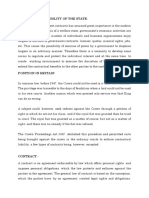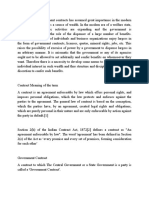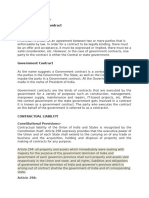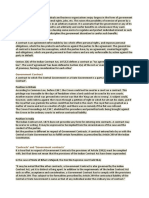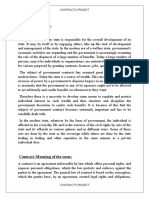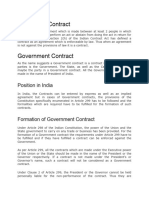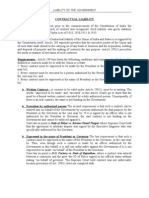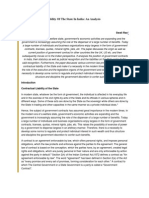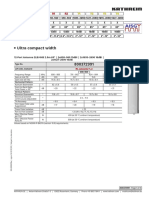Contractual Liability of The Sta (As PDF
Contractual Liability of The Sta (As PDF
Uploaded by
Siyaa KarkeraCopyright:
Available Formats
Contractual Liability of The Sta (As PDF
Contractual Liability of The Sta (As PDF
Uploaded by
Siyaa KarkeraOriginal Description:
Original Title
Copyright
Available Formats
Share this document
Did you find this document useful?
Is this content inappropriate?
Copyright:
Available Formats
Contractual Liability of The Sta (As PDF
Contractual Liability of The Sta (As PDF
Uploaded by
Siyaa KarkeraCopyright:
Available Formats
Contractual liability of the state
Friday, September 22, 2023 9:16 PM
In the modern era of a welfare state, government's economic activities are expanding and the
government is increasingly assuming the role of the dispenser of a large number of benefits. Today a
large number of individuals and business organisations enjoy largess in the form of
government contracts, licenses, quotas, mineral rights, jobs, etc. Thus the Constitution makes
the Union and the States as juristic persons capable for owning and acquiring property, making
contracts, carrying on trade or business, bringing and defending legal action, just as private individuals.
POSITION IN INDIA:
Art. 299(1) of the Constitution lays down 3 conditions, which the contracts made in the exercise of the
Executive power of the Centre or a State must fulfil to be valid. These conditions are:
1. It must be expressed to be made by the President or by the Governor of the State as the case may be,
2. It must be extended to on behalf of the President or the Governor as the case may be, and
3. Its execution must be by such person and in such manner as the President or Governor may direct or
authorise.
The word executed in Art. 299(1) indicates that the contract between the Government and any person
must be in writing. A mere oral contract is not sufficient for the purposes of Art. 299(1).
The Art. safeguards the Government from being saddled with liability for unauthorised contracts. This
means that a contract not couched in the particular form stipulated by Art. 299(1) cannot be enforced at
the instance of any of the contracting parties; neither the Government can be sued and held liable for
breach of such a contract nor can the Government enforce such a contract against the other contracting
party.
KP Chowdhary vs. State of MP
In this case, the Hon'ble Supreme Court has observed that in view of Art. 299(1) there can be no implied
contract between the Government and another person.
The Court took a strict stance on this issue because allowing implied contracts between the Government
and others would essentially render Article 299 useless. If someone had a contract with the Government
that didn't follow the specific requirements of Article 299(1), they couldn't escape those requirements
by claiming that an implied contract could be inferred from the situation.
However, it's important to understand that just because a contract isn't in writing doesn't mean it can't
be valid. A valid contract can still be formed through correspondence or through the process of making
an offer and having it accepted, as long as all the conditions of Article 299(1) are met.
RATIFICATION/ESTOPPEL:
Contracts made in violation of Article 299(1) are considered void and cannot be ratified. The Supreme
Court has emphasized that Article 299(1) is mandatory, making contracts contrary to it void and non-
ratifiable. The doctrine of estoppel cannot be applied in such cases, and parties to such contracts cannot
be estopped from questioning their validity due to the mandatory nature of Article 299.
Caselaw: State of UP vs. Murari Lal
• In this case, the Hon'ble Supreme Court has held that a contract entered into without complying
with conditions laid down in Art. 299(1) is void and that no question of ratification of such a
Constitutional Law -2 Page 1
with conditions laid down in Art. 299(1) is void and that no question of ratification of such a
contract could arise because being void it was not capable of ratification
CONTRACTUAL LIABILITY:
Article 299(2) provides immunity to the President, Governor, or any person acting on their behalf from
personal liability concerning contracts made for constitutional purposes or under any previous laws
related to the government of India.
It's essential to note that this immunity is individual and doesn't shield the government itself from
contractual obligations arising from a contract that complies with the conditions outlined in Article
299(1). In other words, government officials enjoy personal immunity, but the government is still
responsible for fulfilling valid contracts made in accordance with Article 299(1).
Service contracts
A contract of service with the Governments not covered by Article 299 of the Constitution. After a
person is taken in a service under the Government, his rights and obligations are governed by the
statutory rules framed by the Government and not by the contract of the parties. Service contracts with
the Government do not come within the scope of Article 299. They are subject to “pleasure”. They are
not contracts in usual sense of the term as they can be determined at will despite an express condition
to the contrary.
JUDICIAL VIEW:
The judicial attitude to Art. 299 has sought to balance 2 motivations:
1) On the one hand to protect the Government from unauthorised contracts; and
2) On the other hand to safeguard the interest of unsuspecting and unwary parties who enter into
contracts with Government officials without fulfilling all the formalities laid down in the Constitution.
RESTITUTION:
In order to protect innocent parties, the Courts have held that if Government derives any benefit under
an agreement not fulfilling the requisites of Art. 299(1), the Government may be held liable to
compensate the other contracting party u/s. 70 of the Indian Contract Act on the basis of a quasi-
contractual liability to the extent of the benefit received.
What s.70 of the Indian Contract Act prevents is unjust enrichment and it applies as much to individuals
as to corporates and Governments.
Similarly, if the Government has made any payments under a void contract, it can recover the same u/s.
65 of the Indian Contract Act.
State of West Bengal vs. BK Mondal
In this case, a contractor constructed a building at the request of an official who had accepted his
tender. The building was constructed and accepted by the Government but the contractor was not paid.
The Government argued that the request in pursuance of which the building was constructed was
unauthorised and so there was no privity of contract between the contractor and the Government. The
contract did not fulfil the requirements of Art. 299(1) and hence was unenforceable.
The Hon'ble Supreme Court held that though the contract was unenforceable as it did not fulfill the
requisites of Art. 299, yet the State was still liable to pay u/s. 70 of the Contract Act on a quasi-contract
for the work done by the contractor and accepted by the Government.
Constitutional Law -2 Page 2
You might also like
- Contractual Liability of The State 2Document14 pagesContractual Liability of The State 2Gulshan SinghNo ratings yet
- Government ContractDocument17 pagesGovernment ContractPULKIT KHANDELWALNo ratings yet
- Government ContractsDocument8 pagesGovernment ContractsGulshan SinghNo ratings yet
- Govt ContractDocument4 pagesGovt Contractdharshinikarthik2No ratings yet
- Contract Meaning of The Term: Position in BritainDocument7 pagesContract Meaning of The Term: Position in BritainManvesh VatsNo ratings yet
- Contract-Meaning of The Term:: Contracts ProjectDocument16 pagesContract-Meaning of The Term:: Contracts ProjectabhayNo ratings yet
- Contractual LiabilityDocument4 pagesContractual Liabilityadvikasingh21108No ratings yet
- Contractual Liability of GovernmentDocument43 pagesContractual Liability of GovernmentKartik KamwaniNo ratings yet
- Module 5 - Contracts and ServicesDocument8 pagesModule 5 - Contracts and ServicesJohn MariadasNo ratings yet
- Administrative LawDocument3 pagesAdministrative LawBlood MoneyNo ratings yet
- Understanding Government ContractsDocument9 pagesUnderstanding Government ContractsPearl ShellNo ratings yet
- Contractual and Non Contractual Liability of The GovernmentDocument9 pagesContractual and Non Contractual Liability of The Governmenttrupti jatharNo ratings yet
- Constitution - 2 NotesDocument49 pagesConstitution - 2 NotesPooja ManojNo ratings yet
- Liability of Governemnt in Contract-AdminDocument11 pagesLiability of Governemnt in Contract-AdminLashyNo ratings yet
- Research PaperDocument23 pagesResearch PaperishaNo ratings yet
- Const - 2 Dec 2018 5 SemDocument49 pagesConst - 2 Dec 2018 5 SemnavyaNo ratings yet
- LLDocument8 pagesLLricha ayengiaNo ratings yet
- Public and Government ContractsDocument14 pagesPublic and Government Contractsanon_863030596No ratings yet
- Formation of Government Contract: Seth Bhikraj Jaipuria v. Union of IndiaDocument2 pagesFormation of Government Contract: Seth Bhikraj Jaipuria v. Union of Indiahemant rajawatNo ratings yet
- Government ContractDocument6 pagesGovernment ContractAwesome LifeNo ratings yet
- Government Contracts & Liability of StateDocument21 pagesGovernment Contracts & Liability of StateShivam Singh100% (2)
- KP Chaudhary. ContractsDocument7 pagesKP Chaudhary. ContractsatuNo ratings yet
- Contractual Liability of StateDocument18 pagesContractual Liability of StateShivanshu SinghNo ratings yet
- AdminDocument7 pagesAdminLucas KaneNo ratings yet
- Fanl PPT PHDDocument27 pagesFanl PPT PHDAr SoniNo ratings yet
- Class-B.A.Ll.B Viiith Semester Subject - Administrative Law Paper Code - 801Document2 pagesClass-B.A.Ll.B Viiith Semester Subject - Administrative Law Paper Code - 801Shubham GandhiNo ratings yet
- Government ContractsDocument15 pagesGovernment Contractsshilpasingh1297No ratings yet
- Contractual & Tortious LiabilityDocument4 pagesContractual & Tortious LiabilityGangesh Varma89% (9)
- Admin Law Project, Sushma Sosha Philip (715) NUALSDocument15 pagesAdmin Law Project, Sushma Sosha Philip (715) NUALSsushphilNo ratings yet
- Contractual Liability of The Government: Tusharika Singh Roll Number-411Document32 pagesContractual Liability of The Government: Tusharika Singh Roll Number-411Ar SoniNo ratings yet
- Special Prov'Isions in Indian Constitution: PubucDocument16 pagesSpecial Prov'Isions in Indian Constitution: PubucVicky KumarNo ratings yet
- Contractual Liability of The State in IndiaDocument10 pagesContractual Liability of The State in IndiaSatyam KhandelwalNo ratings yet
- Government Contracts: Umakanth VarottilDocument16 pagesGovernment Contracts: Umakanth VarottilAadhitya NarayananNo ratings yet
- Government As A Contracting PartyDocument3 pagesGovernment As A Contracting Partyaniketpavlekar100% (3)
- Conclusion and Suggestion of Contract Project (Final)Document23 pagesConclusion and Suggestion of Contract Project (Final)Ritesh kumarNo ratings yet
- School of Law: Liability of Government in ContractsDocument15 pagesSchool of Law: Liability of Government in ContractsAnklesh08No ratings yet
- Remedies Under ContractsDocument106 pagesRemedies Under ContractsBig Damn HeroNo ratings yet
- Admin NotesDocument12 pagesAdmin NotesSakshi jhanwarNo ratings yet
- (ARTICLE 299) Lays Provisions: ThereofDocument6 pages(ARTICLE 299) Lays Provisions: ThereofDevesh SawantNo ratings yet
- Government ContractsDocument13 pagesGovernment Contractsswarlata.pandeyNo ratings yet
- Overnment Ontracts: 1. Charles A. Reich. The New Property, 73 Yale LJ 733: (1964) Also by The Same Author. IndiDocument28 pagesOvernment Ontracts: 1. Charles A. Reich. The New Property, 73 Yale LJ 733: (1964) Also by The Same Author. IndipriyankaNo ratings yet
- Business LawDocument11 pagesBusiness LawKritika KoulNo ratings yet
- (2021-2026) Fy Ba LLB Contract - Research Paper Iind SemesterDocument30 pages(2021-2026) Fy Ba LLB Contract - Research Paper Iind SemesterBana Divyanshu JadonNo ratings yet
- Adm LawDocument9 pagesAdm LawsiysbsbNo ratings yet
- Government Contract: State of Bihar v. Majeed AIR 1954 SC 786Document6 pagesGovernment Contract: State of Bihar v. Majeed AIR 1954 SC 786TARUN RAJANINo ratings yet
- Imani Y. Majenda - Unenforceable, Voidable, Void and Illegal ContractsDocument8 pagesImani Y. Majenda - Unenforceable, Voidable, Void and Illegal ContractsImani MajendaNo ratings yet
- Assignment ContractDocument9 pagesAssignment ContracttequemorganNo ratings yet
- Obligations and ContractsDocument27 pagesObligations and Contractsjaine0305No ratings yet
- In The Case of State of Bihar V Majeed (5), The Hon'ble Supreme Court Held ThatDocument1 pageIn The Case of State of Bihar V Majeed (5), The Hon'ble Supreme Court Held Thatsimran yadavNo ratings yet
- Dispute Resolution in International Government ContractsDocument7 pagesDispute Resolution in International Government ContractsNACHIKETHNo ratings yet
- Article 299Document1 pageArticle 299simran yadavNo ratings yet
- 13 Government ContractsDocument15 pages13 Government ContractsRamNo ratings yet
- Contract ProjectDocument17 pagesContract ProjectAnubhav VermaNo ratings yet
- Contract ActDocument20 pagesContract ActRameez NajamNo ratings yet
- CONTRACTS (LAW 1 - Post-Midterm) : Stages of A ContractDocument17 pagesCONTRACTS (LAW 1 - Post-Midterm) : Stages of A ContractOmie Jehan Hadji-AzisNo ratings yet
- Business Regulatory FrameworkDocument6 pagesBusiness Regulatory FrameworkYadukrishnan p pNo ratings yet
- Stages of A ContractDocument20 pagesStages of A ContractAshley CustodioNo ratings yet
- Bus. Law & Ind. Relations Notes - 02Document5 pagesBus. Law & Ind. Relations Notes - 02Rozy WasiNo ratings yet
- Petitioner CasesDocument25 pagesPetitioner CasesSiyaa KarkeraNo ratings yet
- Respondent CasesDocument24 pagesRespondent CasesSiyaa KarkeraNo ratings yet
- Collective Responsibility (As PDFDocument1 pageCollective Responsibility (As PDFSiyaa KarkeraNo ratings yet
- Mistake of Fact and Mistake of L (As PDFDocument2 pagesMistake of Fact and Mistake of L (As PDFSiyaa KarkeraNo ratings yet
- Principles of Statutory InterpretationDocument7 pagesPrinciples of Statutory InterpretationSiyaa Karkera100% (1)
- Lab 5.5.1: Basic Spanning Tree Protocol: Topology DiagramDocument36 pagesLab 5.5.1: Basic Spanning Tree Protocol: Topology DiagramAbreham GetachewNo ratings yet
- Course Systemverilog Oop For Uvm Verification Session1 Classes DrichDocument18 pagesCourse Systemverilog Oop For Uvm Verification Session1 Classes DrichDeepak JayarajNo ratings yet
- TEK 03-2A Grouting Concrete Masonry WallsDocument6 pagesTEK 03-2A Grouting Concrete Masonry WallsjerryNo ratings yet
- BL Dwez 01 PDFDocument4 pagesBL Dwez 01 PDFNguyễnVănThiệnNo ratings yet
- Shilpa PPT FinalDocument51 pagesShilpa PPT FinalDrakeNo ratings yet
- English Manual Graitec DadvanceDocument36 pagesEnglish Manual Graitec DadvanceajinomotoNo ratings yet
- 3 Public Procurement Guidelines 2017Document30 pages3 Public Procurement Guidelines 2017Vez HindjouNo ratings yet
- Subject - Application For Enrollment in UNPAR MUNDocument2 pagesSubject - Application For Enrollment in UNPAR MUNKANIA PASYA SUHARDIMANNo ratings yet
- Process Flow Diagram of ETP BD, ChineseDocument1 pageProcess Flow Diagram of ETP BD, ChineseMithen MostafizurNo ratings yet
- Port Terminal Infrastructure and Superstructure - Port Economics, Management and PolicyDocument3 pagesPort Terminal Infrastructure and Superstructure - Port Economics, Management and PolicymerrwonNo ratings yet
- 500 Volts E1316 Versus 4187Document43 pages500 Volts E1316 Versus 4187gattiantonioNo ratings yet
- Natural ResourcesDocument15 pagesNatural ResourcesJessell MakiputinNo ratings yet
- Construction Using BambooDocument4 pagesConstruction Using BambooSitu SainjuNo ratings yet
- AC-0086 Primary Centre Accreditation ApplicationDocument10 pagesAC-0086 Primary Centre Accreditation ApplicationairlinemembershipNo ratings yet
- OFFERING LETTER - Indos Staff Kontrak - Rizky NurhendraDocument2 pagesOFFERING LETTER - Indos Staff Kontrak - Rizky Nurhendraramdhani.alfath08No ratings yet
- Study and Analysis of Local Area Network by Using Packet TracerDocument7 pagesStudy and Analysis of Local Area Network by Using Packet TracerrajNo ratings yet
- Mitigating Congestion in Wireless Sensor NetworksDocument14 pagesMitigating Congestion in Wireless Sensor NetworksIglesia RestauracionNo ratings yet
- Design of A Bus-Station With A Facility For Wheelchairs To Board and Alight A BusDocument3 pagesDesign of A Bus-Station With A Facility For Wheelchairs To Board and Alight A BusOguntayo Daniel OluwafemiNo ratings yet
- Lea 1Document31 pagesLea 1johnny mel icarus100% (2)
- Shivaji University, Kolhapur: Question Bank For Mar 2022 (Summer) ExaminationDocument9 pagesShivaji University, Kolhapur: Question Bank For Mar 2022 (Summer) ExaminationManish JagtapNo ratings yet
- Capital BudgetingDocument12 pagesCapital Budgetingdebjyoti_das_6100% (1)
- Shop & EstablishmentDocument1 pageShop & Establishmentoptimus sales distributionNo ratings yet
- 1957 Djilas - The New ClassDocument221 pages1957 Djilas - The New ClassCentral Scrutinizer100% (1)
- Instructions-Simple (Suitable For AHD-DVRíóSDI-DVRíóEDVRúDocument9 pagesInstructions-Simple (Suitable For AHD-DVRíóSDI-DVRíóEDVRúAnonymous i8RqffNo ratings yet
- Bateria PHILIPSDocument1 pageBateria PHILIPSEnrique S OcampoNo ratings yet
- 4582507317-November-2023 16 38 32.154Document7 pages4582507317-November-2023 16 38 32.154stepouthouseNo ratings yet
- SOP For An Australia Student VisaDocument2 pagesSOP For An Australia Student VisaNighat Naheed100% (1)
- Management Test Case AnalysisDocument2 pagesManagement Test Case AnalysisMaricel CoNo ratings yet
- Ultra Compact Width: 12-Port Antenna Frequency Range Dual Polarization HPBW Gain Adjust. Electr. DTDocument6 pagesUltra Compact Width: 12-Port Antenna Frequency Range Dual Polarization HPBW Gain Adjust. Electr. DTTonzayNo ratings yet
- Construction Equipment Operations and Maintenance Pt.2Document13 pagesConstruction Equipment Operations and Maintenance Pt.2maryNo ratings yet
